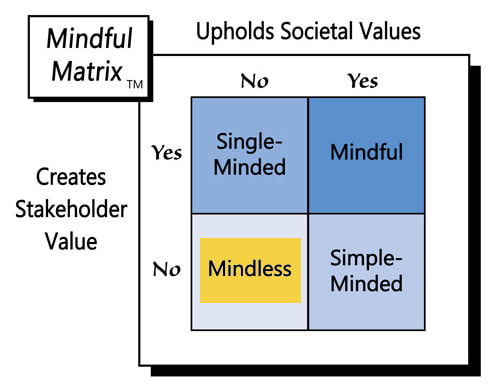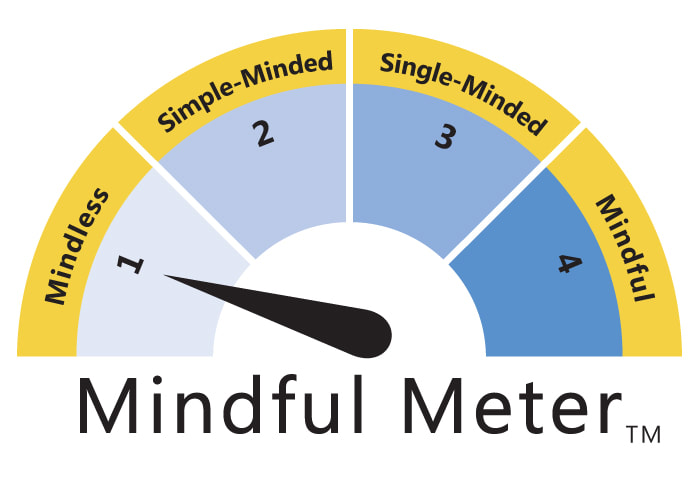Sometime later, she returned to the table with a look of relief. After others left, she told me what had happened. Her own mother, a senior citizen, had received a ‘distressed’ phone call from someone claiming to be her grandson, who said he was sick and needed money. Confused but ready to act, the grandmother called and left messages for her son and for her daughter, the mom at our table, who fortunately was able to explain to her mother that someone was trying to trick her.
I told the mom I was very sorry to hear what had happened and was glad she was able to intervene. I also said I could empathize because the same thing had happened to my mother just a couple of years before! Then the real irony of the situation hit me. Here was a family, attending a luncheon to talk with a professor about marketing, all while they became the victims of a ‘telemarketing scam.’ How could their college visit and any interest in marketing be redeemed?
People do some terrible things under the auspices of “marketing.” Granted, most people are probably quick to differentiate this type of telephone scam from any legitimate business; still, these calls and others involving more or less manipulation form a continuum that many likely lump together as telemarketing. Allow me to paint a picture of that spectrum as I see it, then I’ll return to the targeting the older consumers.
On one end of the scale, call it the left, are calls like the one described above, or worse. Some extremely ruthless individuals conduct “virtual kidnappings” in which they contact victims by phone or social media messaging and pretend they have abducted one of their loved ones in order to collect a ransom. Kidnapping is illegal and considered immoral by most rational people, so it’s nonsensical to support it as legitimate business or valid telemarketing. The practice also involves blatant deception and coercion in that the perpetrators lie to their victims and exert pressure to try to force them to act.
On the opposite, or right, end of the continuum are examples like this one: Your bank calls to ask if you’d be interested in a home equity loan or a great rate on a certificate of deposit, etc. You may or may not appreciate such calls, but you do know your bank is a legitimate business that can follow through fairly on its offerings. Furthermore, if product descriptions are accurate and you don’t feel forced to accept them, there is no deception or coercion.
Occupying the middle of the spectrum are a variety of other phone calls with different degrees of deception or coercion. For instance, at our home we regularly receive calls “about our electric bill.” The voicemail messages are vague enough to make me wonder if they’re from our current utility provider, wanting to correct some kind of billing mistake. However, I realize it’s actually some other company, hoping to gain our business.
Those types of calls are probably not coercive, i.e., if I ever spoke with one of their representatives, I could freely choose whether or not to make a switch. The initial calls, however, are deceptive and, therefore, unethical, which is not a good way to begin a business relationship or any other relationship.
Also in the middle of the scale are calls that say your computer’s software is out of date or it memory is running low, etc. Most of us recognize that those claims are untrue and there’s no way such outsiders could know if they were. So, most people see through the deception, ignore the coercion, and dismiss the calls as scams. However, not everyone does.
Not as technologically savvy as those in the younger generations, many older folks are unsure if the supposed computer issues are real or how serious they may be. So, their relative lack of knowledge makes them more easily deceived. Furthermore, concern that something bad may happen to their computer can coerce them to take unneeded action. Fortunately, however, many senior citizens will first call one of their children, grandchildren, or other trusted individual and ask their advice.
Any of us can be duped about products/services that we don’t know well. For older individuals, there’s the added challenge of declining mental and physical faculties. Their minds often aren’t as sharp as they once were. They may not process information as quickly or remember as many details, both of which can negatively affect their decision making.
In addition, declining physical skills further complicate decreased cognitive capabilities. As we age, our vision and hearing decline, which can prevent us from doing things like reading small print on product packages or catching every word a phone caller says. For these reasons older people are particularly vulnerable to illegitimate forms of telemarketing.
That last sentence and my earlier bank example point to my opinion that, despite the many bad examples, there are legitimate forms of telemarketing, namely ones that provide a fair value to consumers, that use honest communication, and that allow freedom in response, all while respecting individuals’ home lives. For instance, someone in need of extra money may appreciate a phone call from their bank informing or reminding them that it offers a good rate on home equity loans.
In contrast, telemarketing that’s fraudulent is against the law. Title 18 of U.S. Code § 1343 identifies such illegal activity as wire fraud, which involves any interstate or foreign commerce that uses electronic communication to gain “money or property by false or fraudulent pretenses, representations, or promises.” Using the phone to scam people is a “common example” of wire fraud. Those found guilty of wire fraud are subject to fines as high as $1 million and up to 30 years in prison.
However, fraudulent telemarketing is not just illegal, it’s also unethical. It’s deceptive to mislead others about who’s calling and the nature of the call. Similarly, it’s coercive to play on people’s emotions and/or to apply unnecessary time pressure in order to force quick action. It’s especially abhorrent to do those things to individuals who are more vulnerable to such tactics.
So, how did this professor try to help marketing save face with a family and young person considering a career in the field? I explained that such occurrences of coercion and deceit don't represent marketing's core tenet of mutually beneficial exchange. At the same time, such examples are good reminders that those of us in marketing need to work harder to distance such illegitimate behavior from proper practice of the discipline.
I also mentioned Mindful Marketing and the possibility of writing a piece related to the incident for the blog. We talked about more typical college visit items afterward, but as the family was leaving, the mom’s attention returned to the telemarketing scam, and she suggested it would be good if I’d write about those issues.
When Gallup presents its annual research about the honesty and ethical standards of various professions, telemarketers typically rank near the bottom of the results. There are legitimate forms of telemarketing, but phone scams aimed at our moms, grandmas, and other older people certainly aren’t among them. Given that these practices hurt those targeted and can land the perpetrators in jail, such schemes make it easy to call them “Mindless Marketing.”
Learn more about the Mindful Matrix and Mindful Meter.
Check out Mindful Marketing Ads and Vote your Mind!




 RSS Feed
RSS Feed